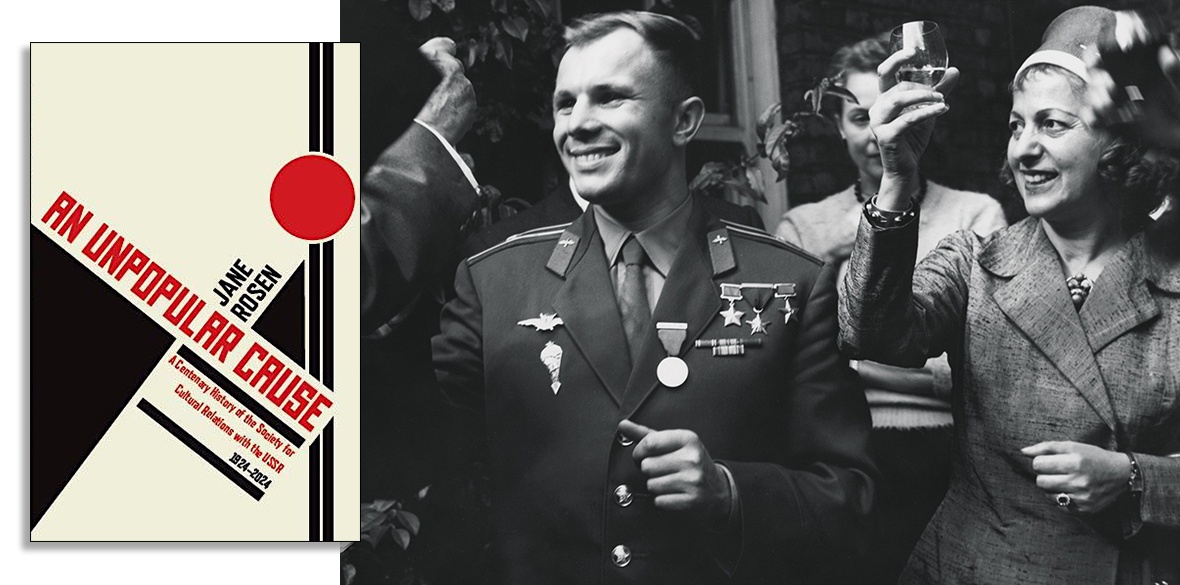This is the last article you can read this month
You can read more article this month
You can read more articles this month
Sorry your limit is up for this month
Reset on:
Please help support the Morning Star by subscribing here
An Unpopular Cause : A Centenary History of the Society for Cultural Relations with the USSR 1924-2024
Jane Rosen, SCRSS, £15
JANE ROSEN points out that throughout its existence the Society for Cultural Relations with the USSR (SCRSS) has had to deal with anti-Soviet and/or anti-Russian propaganda in the mainstream press, lack of funds and varying degrees of invidious surveillance by the British authorities. Yet it has survived due to support from its members and sympathisers and even had periods of popularity, especially during WWII.
In 1924 only a few years after the 1917 Russian Revolution, the Labour government established diplomatic relations with the Soviet government and the society was founded that year by socialists and other progressives including EM Forster, HG Wells, George Bernard Shaw, Virginia and Leonard Woolf, Sybil Thorndike, Julian Huxley and JBS Haldane.
Rosen explains that they were curious about this “newly formed revolutionary country that promised equality for all and was determined to put society, rather than the privileged individuals at the centre of everything it did.”
They marvelled at the rapid achievements of this hitherto feudal society, the vast majority of whose population had been illiterate, and they set out to collect and spread information about it.
Several branches were established, articles written, a library formed, a journal founded, congresses, lectures and exhibitions held and Soviet films shown. Importantly, the society organised and facilitated visits to the Soviet Union by specialist groups from the arts and sciences, so establishing valuable exchanges of ideas and knowledge. These even included a cat fanciers group in the 1990s.
Conversely the society hosted guest lecturers and events such as the 1931 delegation of important Soviet scientists including Nikolai Vavilov and Nikolai Bukharin; the latter was also a politician which generated the hysterical Daily Mail headline “Moscow hater of Britain now in London.”
Other notable events included a visit by Sergei Prokofiev who played some of his work in 1935, and visits by the Soviet writers Ilya Ehrenburg, Mikhail Sholokhov and Alexei Tolstoy. Probably the most glamorous concerts were those in 1937 and 1939 by the highly popular US socialist singer/actor Paul Robeson who was an SCRSS vice-president, both of which sold out and so helped the society’s finances.
From 1931 onwards branches were established in various British cities and by 1934-5 14 existed. But the SCRSS “reached the zenith of its popularity and membership” during WWII when Britain and the USSR were allies against fascist Germany. The society’s membership grew and it was inundated by requests for information about the USSR from organisations and individuals.
This soon changed with the cold war when propaganda and state sabre-rattling demonised all things Soviet. Some members left, yet a core of committed members and guest lecturers braved hostility from the press and the Establishment.
Rosen explains that their constant vigilance from 1960 to 1980 which included coping with state surveillance, kept the society alive. My good friend the late Jean Turner, who was an SCRSS member and later honorary secretary for many years, recalled answering her suburban front door to a man who was clearly from Special Branch checking up on her, but since she had a baby in her arms he was too embarrassed to persist with his enquiries.
Rosen’s book manages to cover a lot of ground. Deft editing by Diana Turner, with discreet but copious references to source material, allows the book to act simultaneously on two levels. It is so well written that it is a real page-turner, something difficult to achieve in non-fiction, and so it is accessible to the general reader, but it is also thoroughly researched and therefore will have lasting value to specialists.
Jane Rosen, author of An Unpopular Cause, will talk about her book, followed by a book signing session with refreshments, on Saturday 2 November, 2pm, at the Society for Co-operation in Russian and Soviet Studies, 320 Brixton Road, London SW9 6AB. Book purchases at £15 can be made at the event by cash or debit/credit card. Advance booking required: www.eventbrite.co.uk/e/1001793420087 (tickets £5, SCRSS members £3).








